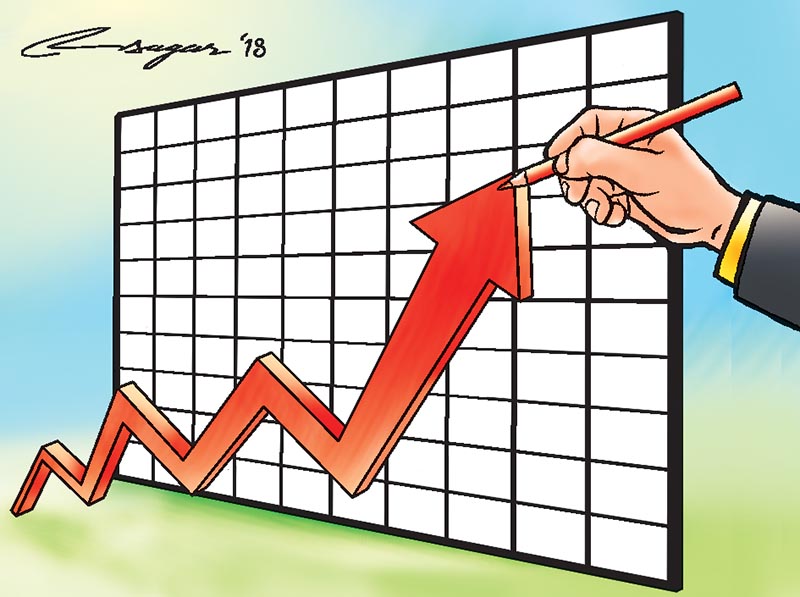Fiscal stimulus: Need of the hour
Lack of fiscal stimulus and poor expenditure trend coupled with non-compliance with the rules and regulations set out by the regulator will take the country’s economy nowhere. It’s time to act now
Prolonged scarcity of loanable funds ultimately puts pressure on the financial system. The financial sector is waiting for the regulator to address the problem of credit crunch. This is however, will not go towards the relaxation in credit to core capital-cum-deposit (CCD) ratio. Nor is there the likelihood of implementation of the Basel iii Accord, a comprehensive set of reform measures, developed by the Basel Committee on Banking Supervision, to strengthen the regulation, supervision and risk of the banking sector.
In the first six months of the fiscal year, the average CCD stood at 78 per cent – two percentage points less that the regulatory limit of 80 per cent. Because of this, banks are almost unable to extend loans. They have stopped taking new loan files and put on the halt all the procedures of disbursing funds to those whose offer letters were already issued for lending. If this situation continues, the country will lag behind and run the risk of being labelled a stagnated economy. The plunge in the stock market is not the result of any sudden particular incident. Actually, investors were facing setbacks one after another. The bearish trend is because of the accumulation of various reasons. One of the prime reasons is lack of vision to see forward, as bureaucrats often see investment here as investment in the non-productive sector.
One needs to be aware of the fact that the financial system, by and large, over the three years has been deeply affected and engulfed by financial sectors, especially from banking and insurance. Banks went on adopting an aggressive approach for their balance-sheet growth, not giving too hoots to regulation compliance. That compelled the banks to play a survival-of-the fittest game that ultimately put the system at risk.
Things are not hunky dory in other sectors of the economy as well. Everyone seems to be interested in parking their money at the banks or investing in the stock market.
Speedy market capitalisation of Nepal’s stock market is lopsided. Why the traders are not enthusiastic about the upward real sector growth still draws attention of the big guns from the private sector. We need more investments on agro-based, tourism and energy industries. That’s the real strength of Nepal.
The irony is Nepal is a poor country but people, or individuals, are rich, as they have money to spend. One example is the huge number of applications even the meagre initial public offerings (IPOs) gather. Who is to blame then? Certainly, finger can be pointed at the existing policies and fiscal profligacy, regulator’s flip-flop on directives and lack of visionary programmes to attract investors towards industries. Questions may also be asked as to why the government is keeping mum on alarming imports of essential goods despite having ballooning trade deficit. The government, actually, is enjoying the whopping rise in the revenue collection derived from imports every year.
Our production base is depleting every year. Arable land is becoming pastures. Farmers have stopped farming in their farmlands. We are yet to commercialise the agriculture sector.
In Nepal, growth is viewed from the financial sector’s perspective.
There is a perpetual relation between financial development and growth. However, researchers have examined some non-linear relationships for economic stability. In terms of cost and benefits, many countries practise trade-offs. The higher the assumptions are considered, the bigger the impediment to the consistent growth.
And there is a deep ambivalence in the banking fraternity. The recent interest rate manipulation vis-a-vis deposit crunch has dissected the vignettes of banks’ manoeuvrings that cross the regulator’s forbearance. There is a lack of fiscal stimulus and the government has a poor track record of expenditures for many years.
Agriculture financing needs a strong regulatory move. However, compliance is a must. The bedrock of doing business is either self-regulate or abide by the rules set out by the regulator.
The fear of high risk of realisation and increasing non-performing assets on a highly unbanked and prioritised sector and the fervent hope of a steady balance sheet growth can never result in economic stability. Behavioural underpinnings of consistent growth after all lie on bringing the unbanked community into the fold.
Importantly, the process of financialisation has taken through Nepal’s economic development, which has resulted in dramatic distortions. Over the years, the financial sector has grown significantly in terms of the paid-up capitals, deposits, stock market capitalization, and more essentially growth of innovative financial products. This growth will now inevitably raise the question whether the development is sustainable or there is consistent growth.
The country is endowed with abundant biodiversity and natural resources. A major share of national economy and well-being of its people heavily depend on sustainability and the use of these resources. With federalism in operation, efficient allocation of resources and expenditure management are expected. How the will the three tiers of government will address the common challenges of Nepal, especially sustainability, livelihood and food security? Only time will tell.
Giri is deputy director at Nepal Rastra Bank






